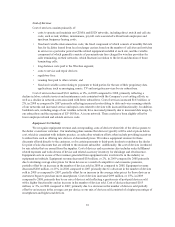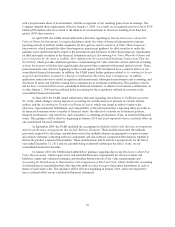Sprint - Nextel 2008 Annual Report Download - page 51
Download and view the complete annual report
Please find page 51 of the 2008 Sprint - Nextel annual report below. You can navigate through the pages in the report by either clicking on the pages listed below, or by using the keyword search tool below to find specific information within the annual report.FCC licenses and our Sprint and Boost Mobile trademarks have been identified as indefinite-lived
intangible assets, in addition to goodwill, after considering the expected use of the assets, the regulatory and
economic environment within which they are being used, and the effects of obsolescence on their use. When
required, Sprint assesses the recoverability of other indefinite-lived intangibles, including FCC licenses which
are carried as a single unit of accounting. In assessing recoverability of FCC licenses, we estimate the fair value
of such licenses using the Greenfield direct value method, which approximates value through estimating the
discounted future cash flows of a hypothetical start-up business. Assumptions key in estimating fair value under
this method include, but are not limited to, capital expenditures, subscriber activations and deactivations, market
share achieved, tax rates in effect and discount rate. A 1 percent decline in our assumed revenue growth rate used
to estimate terminal value, a 1 percent decline in our assumed net cash flows or a 1 percent adverse change in any
of the key assumptions referred to above would not result in an impairment of our FCC licenses as of the most
recent testing date. A decline in the estimated fair value of FCC licenses of up to 20% also would not result in an
impairment of the carrying value.
Accruals for Taxes Based on Income
Uncertainties exist with respect to interpretation of complex U.S. federal and state tax regulations.
Management expects that Sprint’s interpretations will prevail. Also, Sprint has recognized deferred tax benefits
relating to its future utilization of past operating losses. Sprint believes it is more likely than not that the amounts
of deferred tax assets in excess of the related valuation allowances will be realized.
The accounting estimates related to the tax valuation allowance require us to make assumptions
regarding the timing of future events, including the probability of expected future taxable income and available
tax planning opportunities. These assumptions require significant judgment because actual performance has
fluctuated in the past and may do so in the future. The impact that changes in actual performance versus these
estimates could have on the realization of tax benefits as reported in our results of operations could be material.
The accounting estimates related to the liability for uncertain tax positions require us to make judgments
regarding the sustainability of each uncertain tax position based on its technical merits. These estimates are
updated based on the facts, circumstances and information available. We are also required to assess at each
annual reporting date whether it is reasonably possible that any significant increases or decreases to the
unrecognized tax benefits will occur during the next twelve months.
NEW ACCOUNTING PRONOUNCEMENTS
In June 2009, the Financial Accounting Standards Board (FASB) issued Statement of Financial
Accounting Standards (SFAS) No. 168, The FASB Accounting Standards Codification and the Hierarchy of
Generally Accepted Accounting Principles, which establishes the FASB Accounting Standards Codification
(Codification) as the only source of authoritative generally accepted accounting principles (GAAP) in the United
States, except that rules and interpretive releases issued by the Securities and Exchange Commission (SEC) also
are sources of authoritative GAAP for SEC registrants. Subsequent to the issuance of SFAS No. 168, the FASB
will no longer issue Statements, Staff Positions, or Emerging Issues Task Force Abstracts, but will issue
Accounting Standards Updates (ASU) which will amend the Codification. As a result, the Codification
supersedes authoritative literature effective prior to June 2009.
The FASB issued authoritative literature in connection with accounting for Business Combinations,
Non-controlling Interests in Consolidated Financial Statements and Disclosures about Derivative Instruments
and Hedging Activities which were effective for the quarter ended March 31, 2009. The Business Combinations
guidance was adopted on January 1, 2009. As a result of adoption, for our fourth quarter acquisitions outlined in
our notes to the consolidated financial statements, we recognized a gain of $151 million ($92 million after tax)
related to the increase to estimated fair value of our non-controlling interest in VMU. In addition, under the new
guidance, transaction costs and costs associated with exit activities are expensed as incurred. The remaining
guidance did not have a material effect on our consolidated financial statements.
In November 2008, the FASB issued authoritative literature regarding Equity Method Investment
Accounting Considerations, to clarify the application of equity method accounting. Among other things, this
literature requires equity method investors to account for equity investee share issuances as if the investor had
49
























